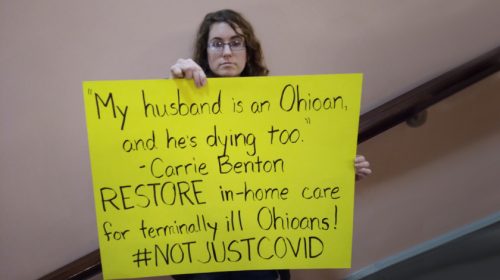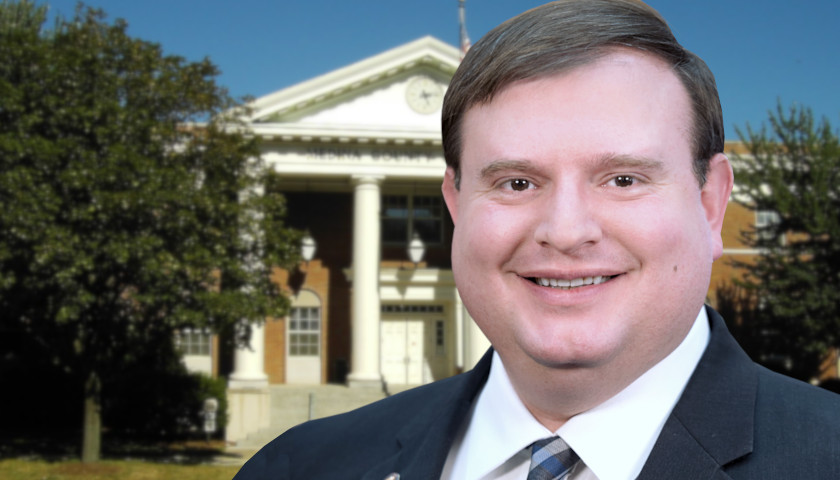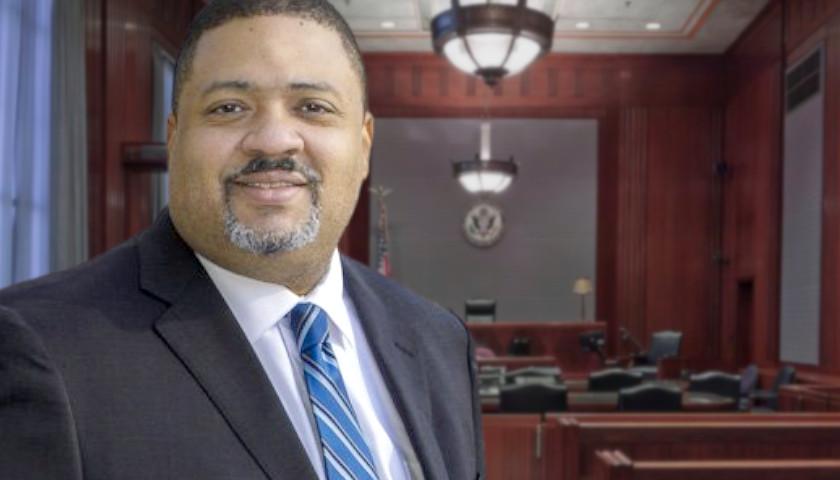It was Tuesday, December 22, the day many in favor of a veto override on Senate Bill 311 (SB311) believed to be the last day for the Ohio Senate to consider and vote on the bill that would restore power to the legislature and check the authority of the Ohio Department of Health (ODH) and its director to quarantine and isolate healthy people.
A group assembled atop the steps leading into the Senate Chamber. Senate President Larry Obhof (R-22) stepped into the space between doors just outside the entrance to the Senate Chamber and was peppered with shouts. “Get 311 on the floor!” “Hold the override vote Obhof!”
The Senate President looked at the citizens and repeated the talking point Ohioans had heard from the Senate for over a week – “the House doesn’t have the votes.”
That comment was met with objections “the House HAS the votes!” Obhof waved his hand to dismiss the comments and walked into the chamber.
The Senate did not bring SB311 to the floor, consequently it did not receive a vote.
One of the citizens inside the Statehouse was Aaron Crater. Crater told The Ohio Star he talked with Obhof’s office on Tuesday and was told that Obhof is in frequent communication with Speaker Cupp and that the House, indeed, lacked the votes to override the veto.
However, the same day Obhof’s office was touting open communication with the Speaker as a reason to justify the claim the House lacked votes, the Ohio House of Representatives filed a petition with 60 signatures from representatives pledging to vote in favor of SB311 – included in the signature section is Speaker Bob Cupp (R-Lima).
Whether the House had the votes or not mattered little to Representative Jay Edwards (R-Nelsonville) who posted a copy of the petition to his Facebook page. In the post he wrote: “The Senate President is not a member of the House of Representatives. He has no idea how many votes we have nor should the House be any of his concern. Even if the House did not have the votes, it is of no concern to him whatsoever. If he truly believed SB 311 should be overrode, he should have done it. Do what you can control and quit blaming others.”
Perhaps the most vocal representative on the matter has been Jena Powell (R-Arcanum). She has consistently urged the Senate – Specifically Obhof -to vote on SB311 and to mind the business in their chamber.
The Senate President is now saying he won’t override a veto on 311 because “the House doesn’t have the votes.”
Since when was the Senate President elected to the House?
— Rep. Jena Powell (@VoteJenaPowell) December 23, 2020
Representative Paul Zeltwanger, in an interview with The Star, said “this is about restoring representative government as defined by the Ohio Constitution. SB311 is a good step to get us back in that direction.”
Zeltwanger also said “We as elected representatives work for the people and it is long past time to give all people and all business owners a voice again! Constitutional and due process rights have been trampled. It’s time to restore liberty and freedom in Ohio. The House has the votes to do that today!”
One renowned Ohio statesman told The Star “Larry believed that he was going to cut a better deal with the Governor, one that dealt with decriminalizing behavior that is otherwise noncriminal. If he wants to trust the Governor to do what’s best, I wish him luck. Unfortunately, for Larry, his legacy will be ‘the guy who stopped the override on the veto.’
State Representative Kris Jordan echoed the lack of trust in Governor DeWine to stick to his word, calling him “Mr. 2 weeks to flatten the curve.”
Members of the House have told The Star they plan to return on December 28 – leaving time before the end of the year for the Senate to put SB311 on the floor and move to vote.
“My Dad didn’t die from COVID, my Dad died from failure to thrive,” said Brian Latham, concerned citizen at the Statehouse on Tuesday. Latham’s Dad was in the hospital for two weeks, without the advocacy and comfort of his family.
“He lost weight and was giving up his will to live,” said Latham who believes not seeing family and his wife of 51 years was too much. “At the end of his stay he was at the point of not eating and wasn’t treated well at the hospital. It wore him out – he died of sudden cardiac arrest.”
SB311 would allow the General Assembly (the House and Senate) to pass a joint resolution rescinding an order or rule – since a resolution is not a law, the Governor could not override the legislative measure.
Power granted to the legislature under 311 could be used to change rules and mandates that have either directly dictated, or indirectly influenced, visitation policies at nursing homes and hospitals.
The senate bill would also give the legislature power to reverse the state’s quarantine guidelines, which are forcing healthy people to stay home.
During several pressers, leaders of Ohio’s Health Zones have iterated and reiterated issues with staffing – healthy doctors and nurses are being forced to quarantine, putting pressure on health systems.
In an interview with The Star, Ohio Education Association President Scott DiMauro talked about the volume of COVID cases and how they are creating a staffing issue in schools. An issue created, perhaps in larger part, by quarantining healthy education workers.
“We know several families – three – who have lost daughters to suicide. This would have never happened had they not been on lockdown and it is 100% linked to these mandates. Every life that is lost is important. COVID deaths don’t trump suicide deaths and deaths from other causes,” said Tracy, a concerned Mom who was inside the Statehouse on Tuesday urging the Senate to take up SB311. “As a Mom, that’s why I’m here.”
Governor DeWine called the bill a “disaster” and said it would put the lives of Ohioans “in jeopardy” during a November 19 press conference – also claiming it would take tools from future governors to respond quickly to an emergency.
DeWine gave the example of a biological agent attack at Wright-Patterson Air Force base by a country hostile to the United States. He said the state would need to act fast and to quarantine the area to stop the spread. “Yet this bill would not allow us to do that,” claimed the Governor.
However, the bill does not strip ODH or its Director of the power to quarantine and isolate – that authority remains.
SB311 provides rules for quarantine and isolation that prohibit ODH or Director from issuing a “general, mandatory statewide or regional quarantine or isolation order that applies to and is enforced against individuals who have not been either directly exposed to or medically diagnosed with the disease that is subject to the order.”
The example of a biological attack in our state does not square up with the 10-month protracted emergency that has afforded ODH and Governor unlimited power – despite rulings against mandates from judges around the state and significant pushback from members of the legislature, including filing impeachment articles.
Senator Rob McColley (R-1) one of the co-sponsors of SB311 – along with Senator Kristina Roegner (R-27) – wrote on Twitter that DeWine’s claims are “not true.” The November 19 tweet is below.
This is not true. Such an order would be neither general, statewide or regional, but would rather be enforced specifically against a limited number of individuals based upon where they came from and not solely upon where they were then located. https://t.co/Ebn2EbS1D3
— Senator Rob McColley (@Rob_McColley) November 19, 2020
SB311 was introduced on May 15 but was not passed by the Senate until September 23. The House introduced it on September 23, but Bob Cupp (R-Lima) sat on it until he referred it to a committee on November 17.
Finally, on November 19 the bill passed with 58 votes – two short of a 60 vote supermajority that would have trumped DeWine’s veto.
Veto is what the Governor did, true to his promise, on December 4.
In a press release explaining the veto the Governor’s office pointed to “objections from health care professionals and business leaders as being detrimental to pandemic response and public health.”
However, in the press release the Governor did not mention what businesses he consulted but did provide a link titled “Ohio Business Roundtable” that points to a letter The Star reported on previously that was endorsed by The Ohio Business Roundtable (comprised of large cap and influential companies) as well as Ohio State Medical Association, the Ohio Hospital Association, the Ohio Children’s Hospital Association, the American Academy of Pediatrics—Ohio Chapter.
The letter was sent to members of the House State and Local Government Committee, urging members to “rethink passing” the bill.
During Ohio’s initial response to COVID, essential and non-essential business designations were chosen by nonelected bureaucrats inside the Executive Branch, along with the Governor. Several small businesses closed while large companies stayed open – a move that diverted untold dollars from small, family-owned enterprises to larger businesses.
Governor DeWine acknowledged the inequity while answering a question from The Star during the COVID briefing on December 23.
Question:
Senate President Obhof said in early December he had the votes to override your veto of Senate Bill 311.
So far, he has failed to bring the bill to the floor.
All week Obhof and members of the Senate have been saying “the house lacks the votes.” Yesterday Obhof’s office said he is in frequent communication with Speaker Cupp and that the House indeed lacked the necessary votes to override.
However, I have a copy of a petition from the House Clerk dated December 22, yesterday, that has been journalized, declaring the House’s intention to override SB311 – containing the signatures of 60 members, including Speaker Bob Cupp.
Governor, you’ve said during these pressers you were in talks on SB311 with President Obhof and Speaker Cupp.
Did you strike a deal with Larry Obhof and if you did, what is the deal?
Governor DeWine’s answer:
We certainly had discussions. It’s always my goal, and I know it’s theirs, to try to work things out. My experience in legislative bodies, usually in a legislative body not as Governor certainly, has been that you try to work things out and try to get things dealt with, if you can.
One of the things we talked about, for example, is one of the inequities – looking back on it, it certainly struck us that there was inequity. For example, a big company, a WalMart for example (not to pick on WalMart) – a big company that sells a lot of different things. They might be selling a product, let’s say jewelry, and the local jewelry was closed but WalMart was open because they were selling groceries. There was an inequity there. In some state of course a lot of consumers complained about that as well so we were trying to look at that inequity going forward as something that we, I, recognized and that we wouldn’t want that inequity to exist again.
So we talked about putting some language, to not tie down a future Governor or a future health department, would keep people safe but would deal with that inequity. That was certainly one of the things we talked about.
Beyond that I can’t comment on what was going on in legislative body. In any closing days of a legislative body, there’s a lot of moving parts and a lot of things going on so I’m not the one to ask about that, but I can tell you in regard to your question – yes, we’re having some conversations, there were some things that we thought we could come together on.
One member of the House talked to The Star on the condition of anonymity. That representative said “it’s unfortunate because people, and especially the press, have short memories. He (Obhof) may not be eligible to be a judge now due to an Ohio law that doesn’t allow him to be appointed right away, and there may not be a vacancy now anyway. But what he can do is take a position at PUCO, the Lottery Commission, Industrial Commission, or maybe Ohio State. But follow him and see where he ends up. This is about a deal but not one made for Ohioans. But it will get him a high income and get him his five year high average,” (which will bolster payout from the state retirement fund).
What’s best for Ohioans is hard to determine by simply watching the Governor’s press conferences and the messaging from his office and the ODH according to Jeanine Mardis, who talked with The Star.
 “The things that DeWine has done have addressed only one group of people – the people he likes to feature on his pressers who he says are dying of COVID or had a hard time with COVID. Of course those people are out there, but there are a lot of other people out there who also are suffering and they’ve had services taken away and are finding this completely unbearable.”
“The things that DeWine has done have addressed only one group of people – the people he likes to feature on his pressers who he says are dying of COVID or had a hard time with COVID. Of course those people are out there, but there are a lot of other people out there who also are suffering and they’ve had services taken away and are finding this completely unbearable.”
Mardis said she was there representing Carri Benton, a wife and mother who lost home health care for her husband who suffers from ALS and dementia.
“I had no idea about this, he doesn’t feature these people on his pressers. I was mortified that I did not know. She needed someone to speak for her, I was coming here anyway so I thought I would tell her story. She’s exhausted, the people in her situation are exhausted. There are five different jobs that would normally be done by five different people but she now has to do all those jobs.”
Mardis continued “I’m not hopeless, that’s why I’m here but it doesn’t look like Obhof cares about all the people of Ohio who are suffering.”
State Representative Candice Keller agreed with that sentiment in a recent Facebook post where she didn’t mince words about Obhof’s deflection and “duplicitous behavior.”
One Senator, Andrew Brenner (R-19), flirted with the idea of moving to bring SB311 to the floor late on Tuesday night, but didn’t.
Members of the Senate who talked on the condition of anonymity said that members had not agreed to bring the bill to the floor before Tuesday’s session. Supposedly, the meeting beforehand among Republicans was contentious – Obhof yelling, claiming it was a bad idea to vote on the bill without the House having enough representatives at the Statehouse on the same day to garner the needed 60 votes.
Apparently, the Senate President was also particularly perturbed about protestors showing up outside his residence.
The fear among Republicans was that the Senate would be left hanging and suffer political retribution if the House failed to deliver on their promise to override.
The fear among Senators who opposed Obhof’s refusal to bring the legislation to the floor was, purportedly, that he would adjourn sine die – immediately and without a future date to convene.
However, there is no set date now to reconvene and that explanation doesn’t account for the opportunity Senators had Tuesday to raise the matter late in the session, since it was believed to be the last.
Whether the blown up deflection to blame the House will result in Obhof calling a session in late December remains a question with no firm answer.
A member of the house did speak about the potential combined culpability of Speaker Cupp and President Obhof in failing to move 311 forward. In an interview with The Star, the representative said “yes, Bob Cupp’s signature is on the petition but it may just be because he was in talks with the Governor too and knew that Larry would sit on the bill – and, hey, he won’t have to deal with him next term. But, I do have to say, many thought that Larry Householder (former Speaker) was politicking and holding things up in the House, but now I think I see clearly that Larry Obhof is the issue.”
It appears that several in the Republican party are infected with fear that there is some type of pending doom if they go against the Governor and President Obhof. Or perhaps there is fear that stepping out and passing a controversial bill will spell doom for their political futures.
_ _ _
Jack Windsor is Managing Editor and an Investigative Reporter at The Ohio Star. Windsor is also an Investigative Reporter at WMFD-TV. Follow Jack on Twitter. Email tips to [email protected].






Gov. DeWhine is tripping out on a power trip. No longer will vote for this Sociailist Gov. So disappointed in his leadership!! Worst Republican gov. ever!
[…] Read More:Obhof Backs Down from Early Threat to Override Veto on SB311 but Bill May Not […]